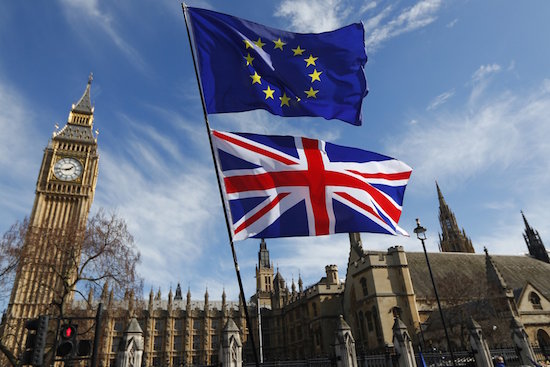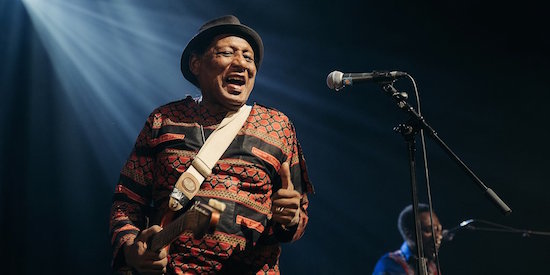The recent rejection of a visa-free work permit for touring UK-based artists and industry professionals in Europe, either by the hand of the UK government, or by the EU (depending on which account you trust), is a significant blow to countless workers, many of whom are already facing challenging times under the COVID-19 pandemic. The impact of Brexit and inadequate government support for arts organisations is not the entire picture, however, and neither should we only consider UK or even EU-based artists and music biz workers when thinking about how art and people move across borders.
New restrictions add further hurdles for artists looking to enter the UK, and follow on from a long history of racist and exclusionary legislation which restricts cultural workers from far beyond the borders of Europe. This is not just a major threat to us as individuals – it’s a threat to internationalism, our cultural ecology in the future, and a further blow to migrants seeking to come to the UK to live and work.
The UK music industry is in serious jeopardy of collapsing as a direct result of both the lack of meaningful support from the Conservative Government throughout the pandemic, and the messy visas row in the Brexit negotiations. According to studies by the Incorporated Society of Musicians (ISM), the UK music industry grew to £5.8 billion in 2020, providing more than four times the value to the economy than fishing’s £1.4 billion. When combined with other creative industries, which are also greatly affected by this lack of provision, the sector is worth £111.7 billion. Before the pandemic, 44% of UK-based musicians earned up to half of their earnings in the EU. Touring forms the fiscal backbone to a lot of artists’ careers, but the current restrictions limit this in numerous ways.
During the Brexit negotiations the UK Government apparently rejected the EU’s standard visa-free offer of 90 working days in a 180-day period. Culture Secretary Oliver Dowden defended the UK’s stance, claiming the EU repeatedly turned down a "mutually beneficial agreement" allowing UK artists to tour and work across the continent without work permits. The UK apparently also attempted to renegotiate the problem through a ‘short-term business visitor’ plan, but this has not worked. As it stands, touring UK musicians will be forced to pay for visas or work permits and equipment haulage for most countries they look to tour in across the EU. Merchandise is also an issue. If you are an artist or band and wish to sell the CDs, records and T-shirts on tour in Germany, France, Italy, Croatia, Luxembourg and Belgium, a sales tax return is required, creating another layer of additional costs and paperwork.
Negotiating individual visas for each EU member state will be both a costly and time-consuming process. Session musicians, along with technical and production teams will lose work. Young, independent and DIY artists of diverse heritages and marginalised communities are already at a clear economic disadvantage, and many will not be able to afford the time and money required to plan for what is already likely to be a loss-making venture.
Given touring and merchandise are such a huge part of artists’ incomes, it is vital that the UK negotiates a clear, free and admin-lite visa deal. With atrocious digital streaming royalties from Spotify and other despotic platforms, very small profits made on solid format sales, and dubious government support for grassroots arts communities and individuals, jeopardising this last and vital source of income will be the final straw on the camel’s back for countless workers and artists. Established artists with PR engines and record labels behind them have an advantage when shouting out and dealing with the new proposed touring visas and streaming issues. We need them to help everyone in the music industry now, more than ever.

For international artists coming the other way, the picture is similarly complicated. EU-based musicians and professionals who are being paid in the UK may qualify for entry under the ‘Tier 5 Creative Worker’ route, if they are sponsored by a UK entity licensed with UK Visas and Immigration for this purpose. To reiterate, this means that the permit, which costs a not-too-hefty £21 for each application per individual artist and professional entering the UK, can only be issued by a sponsor holder. Some organisations, festivals and promoters are already sponsors, but many more aren’t, especially those that remain defiantly or defaultly committed to putting on the sorts of gigs that can change lives, or at least dull weeks, but barely break even.
It costs way-more-hefty £536 to become a sponsor, inflating to £1,476 for larger companies, which instantly rules out part-time or who-makes-profit-anyway promoters. And clearly, this similarly slants the field in terms of class, race, gender and more, towards particularly privileged people with rich parents or other mysteriously anonymous sources of income.
What should we demand? At the least, that artists and their crew can enter the UK freely or on a low cost, low admin basis, and all promoters, venues and organisations can become sponsors for free. If not, the only surviving spaces for EU-musicians looking to play here could be the corporate feel-good village fêtes that our festival circuit increasingly resembles.
Nobody should have seen these problems as a surprise. In recent years, it has become increasingly difficult for non-EU artists to travel to the UK to play. Artists and professionals from African nations, China, India and Russia have to apply for a visa to perform in the UK in an even more exclusionary process than the Tier 5 COS process that EU-based artists and professionals will likely have to endure.
The Womad visa fiasco of 2018 – when three of the acts scheduled for the festival were denied entry to the UK, forcing them to either cancel their appearances or perform stripped down sets – highlighted the injustice of the situation. In an absurd twist, Indian duo Hashmat Sultana only passed through border control 24 hours after they were due to play. As Womad organiser Chris Smith told The Guardian at the time, a growing number of performers were now declining invitations to the event because they found the Home Office’s process humiliating. Hoops artists are forced to jump through include lengthy waiting times, lack of communication from the Home Office, no remuneration or insurance for a failed visa and the expectation that artists have at least £956 in their bank account for three months prior to touring.
In 2007, the 82-year-old Ghanaian highlife legend Ebo Taylor had his visa rejected despite having played in the UK many times throughout his 60-year career. While the application was being processed, the visa office held onto his band’s passports for weeks, preventing them from travelling elsewhere in Europe. As a result, Taylor had to cancel several dates. As Taylor’s manager Ben Makkes told The Guardian, communication from the Home Office was non-existent. They were eventually told that Taylor had insufficient funds in his accounts, despite Makkes’s company stating they would cover all costs. "In the end, we lost €20,000 (£17,000) in flights and fees, and I don’t think we’ll come back to the UK because of that," he said.

The loss of these artists, from the EU and beyond, is a blow to the health of Britain’s cultural ecology. The government is in wilful denial of the fact that our culture is based upon meeting, sharing and movement across borders. Touring artists develop international networks, make new connections, and bring back fresh ideas. For instance, Britain’s vital Afro-diasporic culture, from reggae soundsystem culture in the 1970s through to grime and drill is simply unimaginable without the movement of bodies across continents and oceans.
On top of the effects these ill-thought decisions will have on European artists, it’s easy to gloss over the UK’s malignant history with its own border controls, and how this damages our culture at large. The government has been frank when it comes to how all this intersects with its wider attitudes to immigration, with MP Caroline Dinenage saying that any concession on artist visas is "simply not compatible with our manifesto commitment to taking back control of our borders." In the treatment of artists, we see also our treatment of other migrants.
Campaigning group Migrants In Culture works hard on analysing how attitudes towards cultural sharing reflect wider immigraton policy, and the treatment of migrants. Guided by a vision of culture without borders, Migrants In Culture is a network of migrants organising to create the conditions of safety, agency and solidarity in the culture sector for migrants, people of colour and all others impacted by the UK’s immigration regime. They recognise that the forces of systemic racism and the legacies and continuation of empire, colonisation and extractive capitalism have created a culture sector characterised by borders, oppression, discrimination, and exploitation for migrant and racialised populations. They reject the instrumentalisation of culture for social power, social cleansing and nationalist agendas. Migrants, they rightly argue, make culture.
As Migrants In Culture explain, the treatment of cultural workers merely echoes Britain’s long history of discriminatory border controls, stretching back into its imperial, colonialist past. From the 1905 Aliens Act attack on Jewish migrants from Eastern Europe and the Immigration Act of 1971’s clamp down on "new Commonwealth" immigrants to Britain, to Theresas May’s Hostile Environment, right up to Priti Patel’s recent points-based immigration system and increased border militarisation, the UK increasingly feels like it is tending towards becoming a modern-day ethnostate.
Last year, 29 asylum seekers died in Home Office accommodation, five times the number of migrants who lost their lives on perilous small boat crossings of the English Channel over the same period. The news came at the same time as the ongoing issues with the Jamaica 50 deportations, which has seen inhumane treatment of people from the Windrush Generation. Similarly disturbing are Priti Patel’s Home Office plans to house around 500 asylum seekers in a temporary building in Hampshire akin to an open prison.
Against the backdrop of increasing border controls, for artists and beyond, there are important questions to be asked: Who are the so-called good migrants? Who has the right to live or work here? When Britain got rich from centuries of imperialism and colonialism, waging wars that displace countless people from their homes, and when the country accounts for 1.1% of global warming emissions, who owns rights to ‘our’ land? As Nadine El-Enany writes in her essential account of British colonial law and history, (B)ordering Britain:
"Immigration law in particular teaches white people that Britain and everything within it is rightfully theirs. ‘Others’ are here as their guests. Yet Britain would not be the wealthy, plentiful place that it is without its colonial history. We should not wait for the law to rule on our entitlement to colonial spoils. Even when we are granted access, we are not seen as belonging in Britain. And yet a Britain understood as the spoils of the empire already belongs to us."
The issue with any discussion of border legislation, regardless of whether it directly affects UK-based artists or not, is entangled with these complex histories. In the current moment we face a difficult fight for our jobs, our industry and our culture, but we need to extend our solidarity beyond our own frontiers. The first step is saving the arts, freeing it from the throes of bureaucracy that restricts the movement of creative workers, keeping it as something we can all take part in and enjoy, and making sure it doesn’t become the monocultural reserve of the wealthy elites. Where art leads, society can follow – might we not look forward with hope to the end of all borders?
Sign here to support a campaign for reciprocal freedom of movement demands for both UK and non-UK artists and professionals


